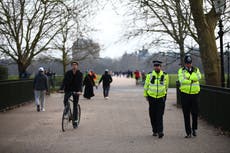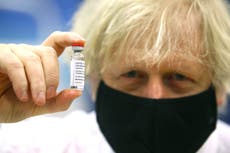Boris Johnson can’t afford to squander the goodwill built up over his approach to lockdown easing
The PM will have to ignore noise from some Tory backbenchers who want a swift unlocking measures restricting the economy

Your support helps us to tell the story
From reproductive rights to climate change to Big Tech, The Independent is on the ground when the story is developing. Whether it's investigating the financials of Elon Musk's pro-Trump PAC or producing our latest documentary, 'The A Word', which shines a light on the American women fighting for reproductive rights, we know how important it is to parse out the facts from the messaging.
At such a critical moment in US history, we need reporters on the ground. Your donation allows us to keep sending journalists to speak to both sides of the story.
The Independent is trusted by Americans across the entire political spectrum. And unlike many other quality news outlets, we choose not to lock Americans out of our reporting and analysis with paywalls. We believe quality journalism should be available to everyone, paid for by those who can afford it.
Your support makes all the difference.There’s an old joke among politicians in which, to bring some light relief from a media obsessed with why they got it wrong, one party colleague asks another: “Why did we get it right?”
When we look back at the coronavirus crisis, today might be one of those moments on which most people agree that Boris Johnson did get it right by easing the lockdown slowly and cautiously. His government has certainly got a lot of things wrong during the pandemic, including delaying the first lockdown last March and easing it too quickly.
Although Johnson won’t admit that in public even though some ministers say it in private, it's to his credit that he appears to have learnt a painful lesson by adopting his “cautious but irreversible” approach to today’s roadmap.
His new Downing Street team in the post-Dominic Cummings era has reined in Johnson’s characteristic over-optimism, which led to him to declare last March that the country “can turn the tide in 12 weeks”, later promise “a more significant return to normality from November” and then that some aspects of life would be “back to normal by Christmas” before diluting his Christmas relaxation at the last minute.
The new roadmap includes the caveats that Johnson’s natural ebullience has in the past led him to eschew. Ministerial aides describe it as an “at the earliest” approach to lifting restrictions on shops, pubs, restaurants, cafes and domestic tourism, after schools in England reopen on 8 March and outdoor contacts between six people or two households are allowed from 29 March. The road on the map will be a long one.
Having learnt from past mistakes by deliberately under-promising and over-delivering on the vaccine rollout, the prime minister might be able to repeat the trick on lockdown easing. Of course, it could go the other way: if there is a worrying rise in the number of infections, the next relaxation could be delayed. But if, for example, the return of schools has less impact than some scientists fear, Johnson could speed up his timetable for reopening the economy. That would add to the bumper crop of positive headlines hailing the vaccination programme’s undoubted success.
The PM has been clever to bill the roadmap as the means of ensuring the current lockdown is the last. Although he raised similar hopes last year, we didn’t have the vaccine then. Whatever the differing views in his party over the balance between public health and the economy, another lockdown would be disastrous for both.
There has been no public sign of the tensions in the cabinet that have marked previous debates about easing restrictions. Rishi Sunak, the chief lockdown sceptic at the top table, appears to have signed up to the cautious approach long favoured by Michael Gove and Matt Hancock. This has taken some of the wind out of the sails of the “economy first” brigade on the Tory backbenches, who smell a rat in one of the roadmap’s four tests for unwinding the curbs – that infection rates “do not risk putting unsustainable pressure on the NHS.”
These Tories suspect the test will allow scientific advisers to keep Johnson’s foot on the brake when he could afford to accelerate. His critics will still make waves, with the help of Tory-supporting newspapers. But the tide inside his party might be turning Johnson’s way. Nine days ago, 63 Tories in the Covid Recovery Group called for the hospitality sector to reopen by Easter, with all legal restrictions lifted by the end of April.
Yesterday, only 40 Tories backed the hospitality industry’s call for an Easter return. That might not happen until June, as there will be gaps of up to five weeks between the proposed four stages of unlocking to test the impact of each relaxation before going further.
There will be a Commons vote on the roadmap, which should not give the government much cause for concern. Because of the deliberately slow pace, Johnson's biggest hurdle might be the need to renew some of the existing measures when they expire on 31 March. A rebellion by 40 Tories would be uncomfortable for Johnson as it could force him to do what no prime minister wants to and rely on the votes of the opposition. But Labour’s support would mean no risk of a Commons defeat.
Another reason why some Tory MPs will not go to the wire is that, despite growing evidence of lockdown fatigue, opinion polls show the public supports the cautious strategy Johnson has finally adopted; almost two in three people prioritise reducing infection rates even if that means keeping curbs in place longer. Johnson's new approach is better late than never.



Join our commenting forum
Join thought-provoking conversations, follow other Independent readers and see their replies
Comments